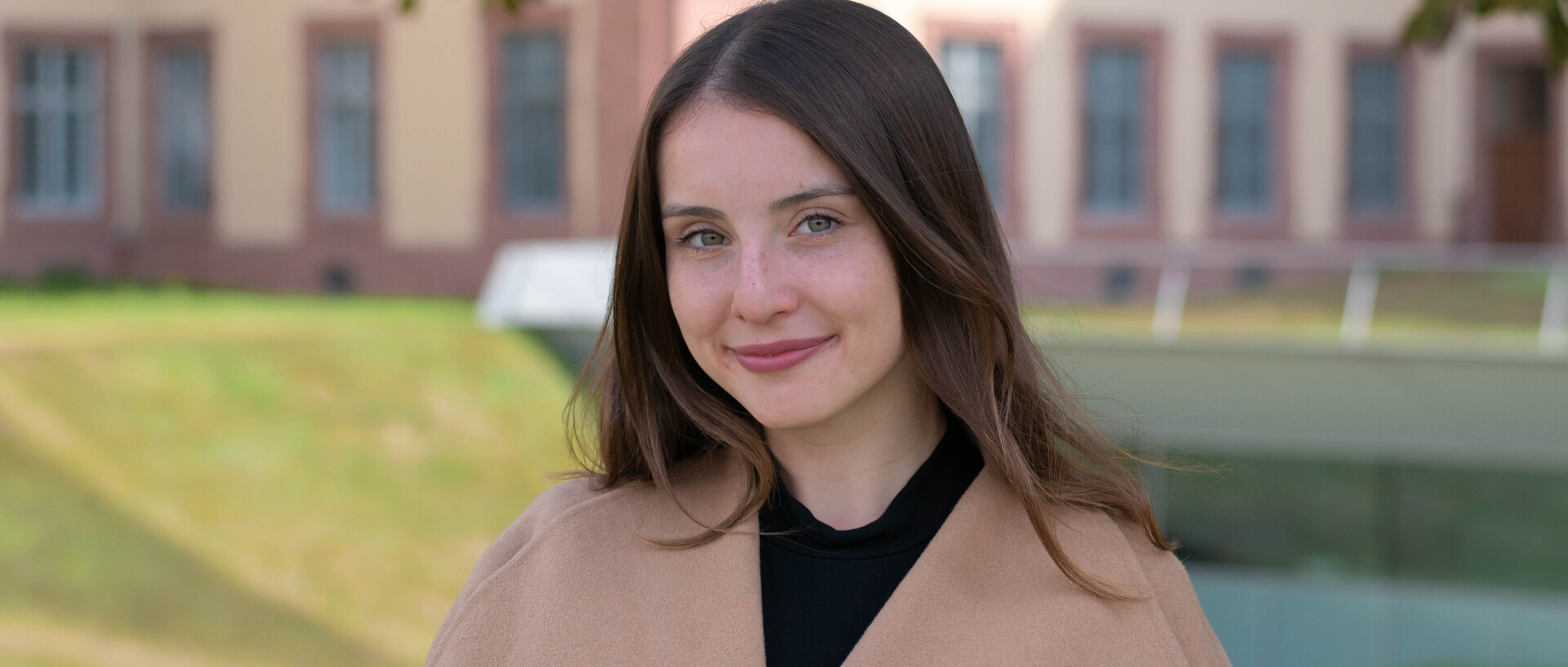“When I Walk Across the Campus, I Feel a Sense of Freedom”
Anna Valerie Smeljanski is pursuing a bachelor's degree in Media and Communication Studies (MKW) at the University of Mannheim. She is currently in her fifth semester. The 21-year-old is active with the MKW departmental student representatives and supports first-year and second-year students as a tutor, helping them better understand the lecture content. In her private life, however, the student with Ukrainian roots has been focusing on something else for the past eight months: Helping refugees from Ukraine. In Anna Valerie's myUniMA story, you can find out what this commitment has to do with her degree program and what the municipality of Plankstadt even honored her for.
Why did you decide to study Media and Communication Studies in Mannheim?
When you get to know me, you will quickly realize that I love to communicate (laughs). Communication is a great strength of mine and I wanted to expand my knowledge in this field. Programs combining communication with media are rather rare at German universities, and along with the academic perspective we take in Mannheim, it's the perfect combination for me. Digital communication, in particular, has become an integral part of our private and professional lives – and since I would like to work in this field in the future, I am happy to learn the basics at the University of Mannheim. I also like the university’s international orientation. I grew up with two different cultures myself and am very interested in learning about new cultures. When I walk across the campus, I feel a sense of freedom: It is buzzing with life, you can hear many different languages, and I really enjoy talking to international students.
You don't just come to the university to attend your lectures and seminars. What else do you do besides studying?
Since last year, I have been a tutor for the two MKW lectures in the first and second semesters. This means: Once a week, I meet with two small groups of students, assist them in reviewing the last lecture and answer any questions they may have. I am very happy when I can help them understand the lecture content better so that they are more motivated to deal with the topics covered in class. I am also involved with the MKW departmental student representatives. Thanks to their support, I was able, for example, to organize a large fundraising campaign together with other students and the German Caritas Association Mannheim at the beginning of the war of aggression on Ukraine. Even professors supported this campaign, which I really appreciated.
Raising money is not the only way you help Ukrainian refugees. Where does your commitment come from?
My family comes from Kharkiv – a city in the east of Ukraine – and unfortunately some of them are still there. It was clear to me right at the beginning of the war of aggression that I wanted to help the Ukrainians. In doing so, I can make the most of my communication skills: I do not only speak German and English, but also French, Ukrainian and Russian. Since the beginning of the war, translators are needed everywhere, which is why I have already helped in several places. In March, the municipality of Plankstadt asked me if I could support them in advertising accommodation for people from Ukraine. So I talked to many Ukrainians on the phone and tried to convince them to flee their country and come to Germany. It was a very challenging task for me – but when I met those people in person in Plankstadt, they expressed their gratitude to me, as they might not have dared to take this step if they hadn't talked to me. The municipality of Plankstadt even presented me with a certificate of appreciation for my commitment. I also assisted the Mannheimer Morgen newspaper with their correspondence with a Ukrainian journalist. It's really rewarding to be able to use my various foreign language skills for something so meaningful.
Are there any other projects you have been involved in?
My mother works for the Merck Group in Darmstadt, which organized a summer camp for the children of their employees. We worked to ensure that Ukrainian children were also invited to take part. For six weeks, we had a specific theme every week, for example a swimming camp or a soccer camp. In total, more than 100 Ukrainian children took part in the camp; some of them even commuted every day from as far away as Mannheim or Marburg. I was on site every week, helping to take care of the children. I enjoyed seeing those children, who had experienced such terrible things in Ukraine, start to thrive. Several mothers visited us and thanked us because they had not seen their children so happy since the beginning of the war – this is, of course, a great acknowledgment of the work we do.
Is your help still needed at the moment?
From time to time, I get a call from the municipality of Plankstadt – for example, when they need my help with translations for housing or job placements. Besides that, together with my brother, I support the “Perspektive Ukraine e. V.” association, which is based in Frankfurt. They are currently taking care of bringing materials for school lessons to Ukraine, as many schools have been destroyed and the children now have online lessons. These kinds of experiences make me even more aware of how fortunate we are to be able to live here in safety and peace. And I am all the more grateful that the readiness to help is still so great in Germany, even after several months.
Text: Jessica Scholich / October 2022
